TILT ANNUAL REPORT, 2016-17
HOME | Advancing Curricular Excellence | Engaging Students | Supporting Sutdent Success | Promoting Faculty Development
Advancing Curricular Excellence
Provost’s Learning Collaboratory for Course/Curriculum Redesign and Research on Learning
13 Residential-instruction Faculty and 2640 enrollments in Provost’s Learning Collaboratory for Course/Curriculum Redesign and Research on Learning
Faculty were invited to apply for a Provost Learning Collaboratory Award to support course redesigns: (1) curriculum redesign for multiple courses or a single large enrollment course; (2) mini course redesigns supporting a redesign of some aspect of a course; and (3) research grants to investigate learning and teaching at CSU with the intention to apply what was learned. Provost Collaboratory Awards were provided in: Chemistry, English, Life Sciences, Math, Mechanical Engineering, Microeconomics, Natural Resources, Professional Languages, Psychology, Speech and Communication.
Courses Using High-impact Practices (HIPs)/Adaptive Courseware
2395 RI enrollments and 5 APLU faculty in Courses Using High-impact Practices (HIPs)/Adaptive Courseware
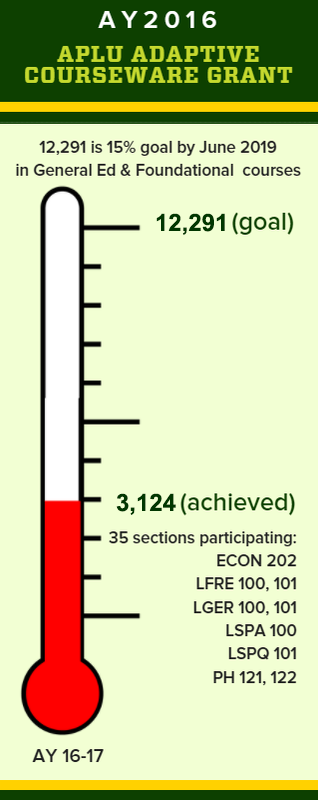 In an effort to augment the Student Success Initiative 2 (SSI 2) through High Impact Practices, TILT received the large grant: Accelerating Adaptive Learning Courseware at Public Research Universities Grant from the Association of Public & Land-grant Universities (APLU) for the grant period of July 2016 through December 2019. This funding was awarded to combine the integration of adaptive courseware with the integration of HIPs in class. Adaptive courseware promotes the development of robust learning of content and skills outside of class allowing instructors to implement the use of HIPs and active learning during class time. The grant supports the use of Adaptive Courseware in key courses to enhance Constructive Feedback, particularly large-enrollment courses. The grant requires that 15-20% of the general education enrollments are taught with an Adaptive Courseware component. The criteria used for identifying courses eligible for support include, among a willingness to incorporate HIPs:
In an effort to augment the Student Success Initiative 2 (SSI 2) through High Impact Practices, TILT received the large grant: Accelerating Adaptive Learning Courseware at Public Research Universities Grant from the Association of Public & Land-grant Universities (APLU) for the grant period of July 2016 through December 2019. This funding was awarded to combine the integration of adaptive courseware with the integration of HIPs in class. Adaptive courseware promotes the development of robust learning of content and skills outside of class allowing instructors to implement the use of HIPs and active learning during class time. The grant supports the use of Adaptive Courseware in key courses to enhance Constructive Feedback, particularly large-enrollment courses. The grant requires that 15-20% of the general education enrollments are taught with an Adaptive Courseware component. The criteria used for identifying courses eligible for support include, among a willingness to incorporate HIPs:
- High enrollment.
- High D/F/W rates and/or high number of Pell recipients,
- Incorporation of an existing Adaptive Courseware platform.
Additional outcomes include:
- Faculty Partnership with TILT Instructional Designers
- Faculty Development Workshops and Consultation Sessions
- Assisting with redesign implementation
- Refining subsequent course offerings based on “lessons learned.”
- Faculty Development Opportunities
- Faculty Collaboration Meetings
- TILT Summer Conference
- CSU Professional Development Institute
- Individual Consultations
- Intercollegiate collaboration among faculty through the APLU cohort.
AY 16-17 Adaptive Courseware Participants
Course |
Faculty |
Efforts |
Semester Enrollments |
Economics |
Karen Gebhardt |
Developed active learning lessons |
1855 |
Languages, Literature & Cultures |
Courtenay Biser-Suarez |
Implemented adaptive courseware |
540 |
Physics |
Brian Jones |
Developed active learning lessons |
729 |
Online Course Design and Development Encouraging the Use of HIPs and Effective Instructional Design
Approximately 70 Faculty Engaged in Online Course Design and Development Encouraging the Use of HIPs and Effective Instructional Design
The online course development team works closely with faculty to fully design and develop a limited number of online courses, which CSU Online selects. Some advantages to working with TILT instructional designers (IDs) include:
IDs provide additional services to faculty including technology expertise, guidance on accessibility and copyright compliance and video and graphics support.
Collaborations Related to Online Course Development
From Fall 2016 through Summer 2017, members of the online course development team:- Collaborated with the School of Social Work on its online/hybrid curriculum redesign for undergraduate and graduate programs.
- Worked with CSU Online to develop a way to introduce faculty to the course-design process earlier and more substantively.
- Continued discussions with the Access Center/Alliance Partnership about potential TILT instructional-design support for Alliance teachers. Tasks included attending annual Alliance Partnership High Schools’ onsite spring meetings and developing a “stakeholder” survey as a formative evaluation of Alliance teacher needs.
- Assisted with Academic Computing & Networking Services (ACNS) Open Labs, which instructors attend to gain assistance and guidance in using Canvas.
- Provided assistance to faculty as a TILT Canvas Coordinator, answering questions about and troubleshooting in Canvas.
- Participated in the hiring process for the Department of Human Development and Family Studies (HDFS) online assistant professor at the request of the department.
- Attended School of Social Work discussions on the use of outcomes and portfolios in Canvas for the Master of Social Work program.
- Contacted Betsy Gilbertson, ID at Auburn University’s Biggio Center for the Enhancement of Teaching and Learning, to discuss her Online Course Design Workshop as a potential professional-development opportunity for the TILT online course development team.
Partnerships Related to Online Course Development
Partners of the TILT online course development team include:- CSU Online
- ACNS
Online Course Development Projects
From Fall 2016 through Summer 2017, members of the online course development team:- Shot, edited and produced videos and lectures.
- Developed multimedia simulations including Flash, Captivate, and C# (ANTH 275, CSU MOOC: Conflic Managment for College Students, PSY 152).
- Redesigned TILT's course design and development team Web site.
- Created shareable, online bibliography of teaching and learning resources and research.
| Adobe Captivate Example (Click the image below to play) | Adobe Animate CC (Flash) Example (Click the image below to play) |
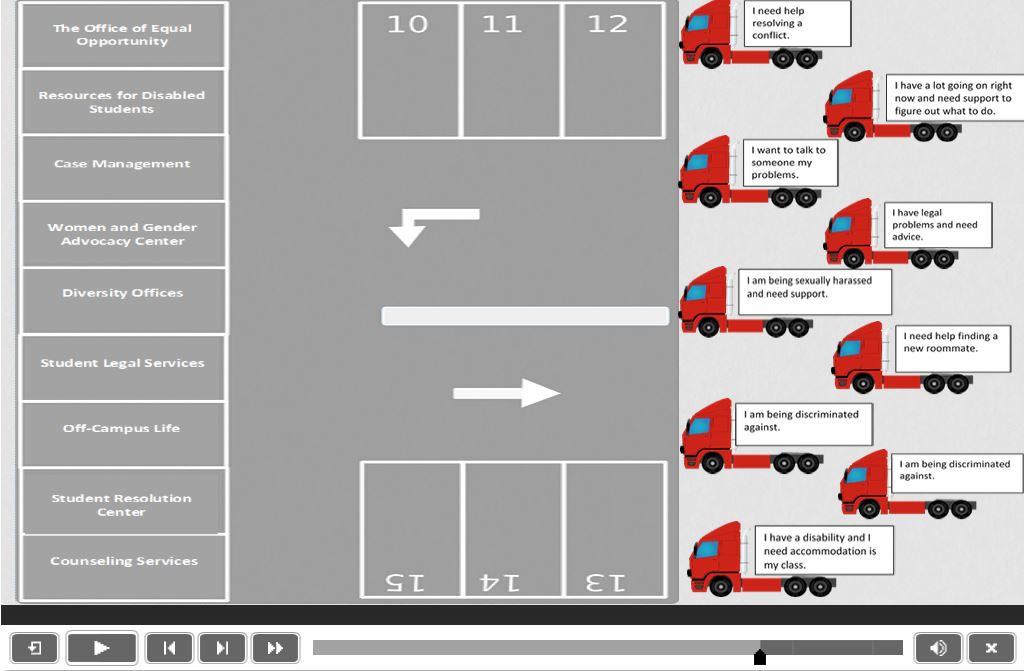 |
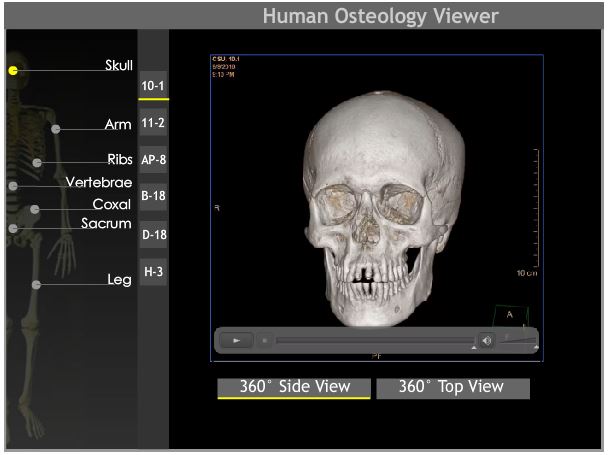 |
Online Courses Designed and Developed Encouraging the Use of HIPs and Effective InstructionalDesign
1384 Enrollments Impacted in Online Courses Designed and Developed Encouraging the Use of HIPs and Effective Instructional Design
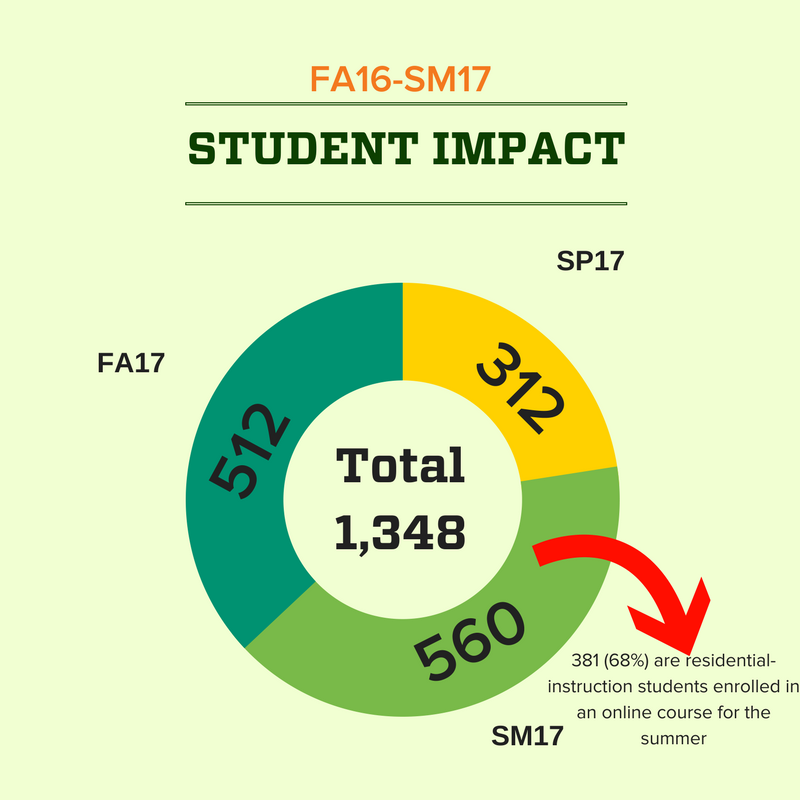 For Online Courses Developed from Fall of 2016 through Summer of 2017:
For Online Courses Developed from Fall of 2016 through Summer of 2017:
- Impacted an estimated total of 1,384 enrollments in TILT-built courses.
- 312 enrollments in Spring 2017
- 560 enrollments in Summer 2017
- Of these enrollments, 381 (68%) are residential instruction enrolled in an online course for the summer.
- 512 enrollments in Fall 2017
Courses Integrating the Use of Technology
6964 Enrollments Impacted in Courses Integrating the Use of Technology
 Online Course Development from Fall of 2016 through Summer of 2017:
Online Course Development from Fall of 2016 through Summer of 2017:
- Developed or enhanced approximately 70 academic courses in the Canvas learning management system (LMS).
- Technology Enhancements for Residential Instruction (5580 enrollments and 75 faculty partnerships impacted)
- LMS Integration
- Coordinated a standalone instance of Canvas for NR 220 at the Mountain Campus (500 enrollments)
- Consulted with Semester at Sea IT staff on the possible implementation of a standalone instance of Canvas for SES as was accomplished for NR220
- Representation on the Digital Tool Integration Committee
- Consulted on accessibility issues in Canvas
- 3D Printing: 650 enrollments
- Biochemistry and Molecular Biology: built a custom, multi-use 3D printer
- Natural Resources / CSU Ventures: grant involving the printing of large scale relief map, development of a projection system and the development of GIS software for projection.
- The Outdoor Program at Colorado State: printing a large scale topography
- Civil Engineering: printing a large scale hydrographic topography
- Partnering with a post-doc in Civil Engineering on printing a large scale hydrographic topography for research and student use.
- Courseware
- Math 160 (792 enrollments): implementation of the Ximera Courseware platform and open textbook
- Unizin Engage: Recruitment of faculty for the eText pilot (13 courses and 3173 enrollments in Fall 2017). Courses include: CO 150, CO 301B, GEOL 120, LIFE 210, BC 353, STAT 301, MATH 155, CS 163, CS 164, CIS 355, FIN 342, FIN 470, FIN 603
- Mobile App Dev: 475 enrollments
- Todos Santos faculty of Natural Resources: CSU Baja Field guide
- Environmental and Radiological Health Sciences: Environmental Health App
- NR 220: Pingree Park Field Guide
- Virtual Reality: still under development
- BioChemistry and BioMedical Sciences: integration of Virtual Reality technology into undergraduate courses
- Accessibility
- Worked with a student who is blind, on Canvas accessibility issues in conjunction with the CDT team
 |
 |
| Pingree Park Field Guide | CSU Baja Field Guide |
Supported Online Courses
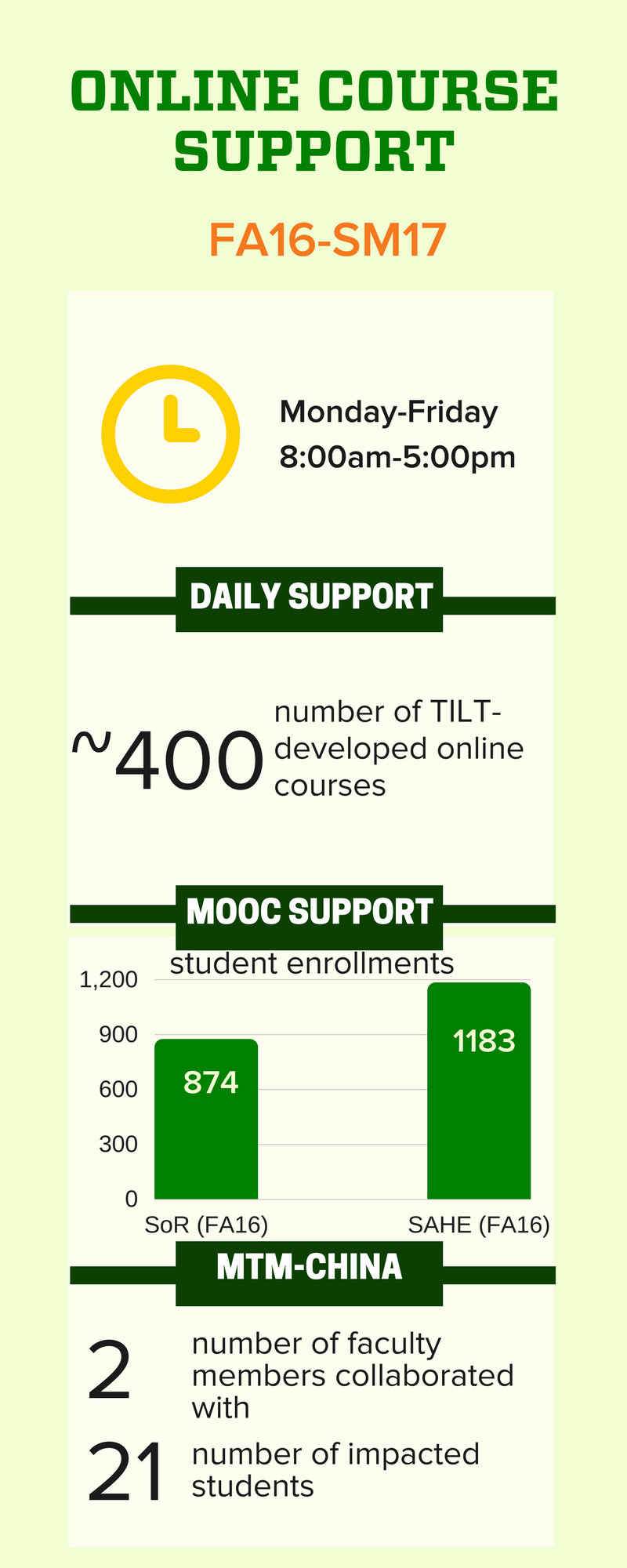 Approximately 400 Online Courses Continually Supported
Approximately 400 Online Courses Continually Supported
- Daily Support:
- Continued support of all TILT-developed online courses—approximately 400 total. This support includes:
- Completing minor edits, updates and enhancements regarding course organization, materials, assessments, videos, learning objects and technology.
- Troubleshooting and resolving issues with content, videos, learning objects, technology and the Canvas LMS.
- Providing solutions and advice related to instructional design and online course development.
- Responding to questions related to the Canvas LMS, grading, course setup, materials, assessments, technology and best practices in instructional design and online course development.
- Massive Open Online Courses (MOOCs):
- Continued support of two MOOCs for faculty and enrollees:
- Science of Relationships: Fall 2016 (1,183 enrollments)
- Exploring the Student Affairs in Higher Education Profession: Fall 2016 (874 enrollments)
- Master of Tourism Management (MTM)-China:
- Continued support of 13 Mandarin online courses for faculty and students.
- Collaborated with two faculty members and impacted 21 students from Fall 2016 through Summer 2017.
Students Impacted by Service Learning Courses
140 Faculty supported in the delivery of 140 Service Learning Courses and reulted 3500 Students Impacted by Service Learning Courses
Office of Service-Learning TILT Report Contribution
*Reported over 185,000 hours to the CSU STARS (Sustainability Tracking, Assessment & Rating System) application for annual service-learning hours, and instrumental in supporting our 2016 Platinum status achievement (in 2015 CSU was the first and only campus to gain this status). This data was generated through the CSU Faculty Service-Learning Phase I Assessment to calculate number of students engaged and hours contributed to service-learning, community-based research, and community engagement through coursework.
*In partnership with SLiCE, submitted data for the President’s Higher Education Community Service Honor Roll and tallied 23,300 students engaged with 243,658 hours of community service. Estimating that one volunteer hour in Colorado is worth $22.14 (based on national volunteer value provided by the National Corporation for Service), CSU's financial contribution to communities was $5,394,588.
*Supported CSU Faculty with 140 unique service-learning courses serving 3500 undergraduate and graduate students.
*Offered $10,000 in funding support for Faculty mini-grant competition resultant in approximately 6-8 new courses and/or course re-designs annually.
*Completed our Winter Warming Shelter Pilot Study with the City of Fort Collins (housed over 200 people), and established a collaborative CSU student service-learning training program in partnership with Catholic Charities and the City of Fort Collins.
*CSU’s Board Member representative for our regional Campus Compact of the Mountain West and co-sponsored the “Imagining America” Regional Engaged Faculty Institute with over 100 participants from 15 academic institutions.
* Supported Key Service Communities staff restructure and funding, resultant in a substantive increase in CSU student learning community outcomes and staff satisfaction: Demographics of the Key Service Community = Gender: Male – 40%, Female – 60% Residency: Colorado – 72%, Non-resident– 28% Ethnicity: Students of Color – 45%, White – 48%, Unknown – 7%; Key students are retained to the second fall semester at a rate that is higher than CSU’s overall rate (89.1% compared to 86.6%): Key was Non-Key Plus; 2.94 Cumulative GPA (114 average Index) compared to Key Plus: 3.10 Cumulative GPA (110 average Index); Overall, CSU learning community students had a higher GPA in Engineering, Health and Exercise Science, and Arts & Creative Expressions.
*Student representation for Service-Learning and Community-Based Research posters at CSU’s Celebrate Research and Creativity (CURC) increased by 15%.
Community Members Impacted Through Diverse Mindfulness Presentations, Shared Practice Tools, and Training
500+ students served along with staff and faculty and 1,000+ community members through diverse mindfulness presentations,shared practice tools,and training
Center for Mindfulness TILT Report Contribution
*Hosted the “Third Annual Regional Mindfulness Dialogue in Higher Education” conference at CSU this year with over 80 participants and 8 academic institutions represented.
*Through our “Building Compassionate Communities” initiatives, partnered with key community partners including, but not limited to; Wounded Warrior REST Sleep Intervention Research, The Homeless Coalition Mindfulness Meditation in Homeless Populations, Suicide Prevention Network, CSU Health Network and CSU Professional Advising Staff, OSHER and CSU Athletics, to offer mindfulness practice tools and promote overall wellbeing.
* Completed “CSU Mindful Leaders Faculty Training: Integrating Mindfulness for Transformational Leaders” funded by a Contemplative Pedagogy Teaching and Learning Grant from the National Center for Contemplative Mind in Society. Written survey results from 20 CSU Faculty showed 33% reported that they had immediately implemented one of their new skills into their classroom. A 15% increase from pre- to post-survey reflected a stronger connection with mindfulness and social justice action.
*Served over 500+ students, staff and faculty and 1,000+ community members through diverse mindfulness presentations, shared practice tools, and training.

Testimonials
Dr. Karen Gebhardt: ECON 202
Dr. Brian Jones: PH 122
